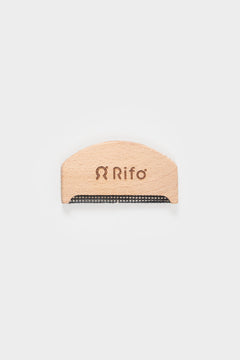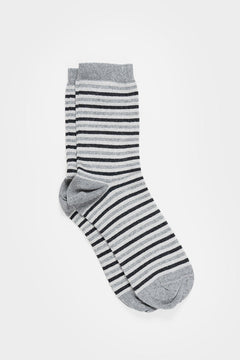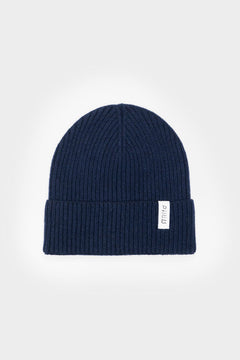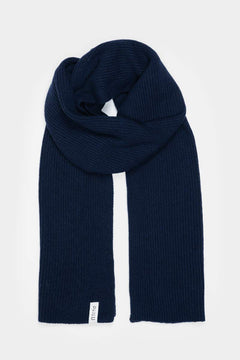Recycled materials are not enough to make a garment sustainable, also the production processes matter.
We at Rifò know it very well: producing a clothing collection in the most sustainable way is a daily challenge.
It means to question everything everytime, especially the most conventional production models. The scale economy for example, for which the more you produce the more you can reduce the product cost.
One of Rifò's pillars has always been to produce only what people need, in order to avoid overproduction.
Growing as a company, however, requires us to produce more consistent volumes, and therefore we find ourselves asking which is the correct way to do it.
We wrote this article because we think that it is right to share with people even the most critical paths, not only the positive aspects of our work, such as the reduction of our water consumption or CO2 savings.
For this reason in this article we will talk about scale economy and we will explain our way to overcome it.
What does scale economy in fashion mean?

The term scale economy stands for the relationship between the quantity of goods produced by a company and the unit cost of the finished product.
As production volumes increase, the unit cost of the asset decreases.
It's like a 3x2 offer at the supermarket: the more we buy, the less we pay for the single good. The same logic.
So brands that produce on a large scale are able to keep low the costs of:
- raw materials
- production
- finished products
How? By purchasing large quantities of material and producing a lot, in order to ask for discounts all over the supply chain. Everything without thinking too much about the real market demand.

Those who produce on a large scale agree to earn less on a single product, because they can count in a large distribution chains to guarantee profits.
It doesn't matter if a huge part will be destroyed to follow next year trends.
The consequence of scale economy is overproduction and it is the price the planet is paying to allow us to find a t-shirt for € 4.99.

Recycled but overproduced
In recent years we have seen a real explosion of sustainability. It has become a marketing keyword, and therefore even big brands had to deal with this new demand from the market. For this reason, recycled and ethical materials are increasingly researched.

The good news: people, with their sensitivity towards ethical consumption, triggered a change.
The bad one: the market is using sustainable fibers, or at least so called ones, without a real reflection on the production processes impacts.
This is the case of recycled polyester and polyamide, recently largely used by many brands, particularly in the swimwear. But how were these garments produced? Where? And also, how many single-use plastic bottles should continue to produce to be able to make this recycled yarn?
Why scale production can't be sustainable
To recap: producing using recycled materials but doing it on a large scale is a paradox, for two reasons basically.
We referred to one earlier: the risk of overproduction. As mentioned, the possibility of destroying the unsold is better than producing on a small scale with local artisans.
Important newspapers spoke about the scandal of the destruction of tons and tons of new clothing, both about fast fashion brands such as H&M, but also for luxury brands like Burberry.

So here's the second reason that makes the scale economy unsustainable. The place where this takes place.
It is clear that large numbers at the lowest cost can only be made producing where labor costs are low. Very often these large productions take place in China, Bangladesh, North Africa, Vietnam... where the protections for workers are much weaker than those existing in the European Union.
An impact on the rights of workers in the textile sector, but also on the environment. Since raw materials and their derivatives must be displaced and transported consuming big quantities of CO2.
![]()
The sustainable brand dilemma
"Ok, but you can produce everywhere on a large scale". This is true. Precisely for this reason we would like to tell you about our dilemma.
For example, to be picky, if we produce 50 sweaters instead of 10 we are still doing scale economy. So how can we avoid producing more than necessary?
We feel very lucky with the success of Rifò products, but at the same time aware that we are like a tightrope walker.
Rifò's way to avoid overproduction
To continue listening to people's real needs and meeting a growing demand, we have decided to extend the waiting time of our pre-order model.
Last year we realized that producing in real time, almost on demand, in just two weeks could not be sustainable for us.

So this year we try to ask for an effort from the people who buy our products. By doing so we give our craftsmen the time to manage more important productions.
We realize that in a world of "delivery by tomorrow if you order within 4 hours", where "tomorrow", maybe it's Sunday, we are doing something outside of the box. We do it because we believe in people and their genuine desire for a change.
All of our new recycled cashmere garments are currently in production and will arrive in early November, just in time for the cold. Here you can find all our latest products on pre-sale.
In addition to this have decided to implement a slightly different sales strategy also with shops that buy our products, asking them to make scheduled orders, in order to satisfy them without having to store too much goods in our warehouse.
Once again we didn't choose the simplest solution, but the transparency one.
And since we want to rely on real needs, we are happy to receive feedbacks.
We are curious about yours. You can write them below or on all our channels, social networks, e-mails, but also with a phone call...
Tell us your opinion on scale economy, on the right strategies to avoid it and about our pre-sale strategy.








